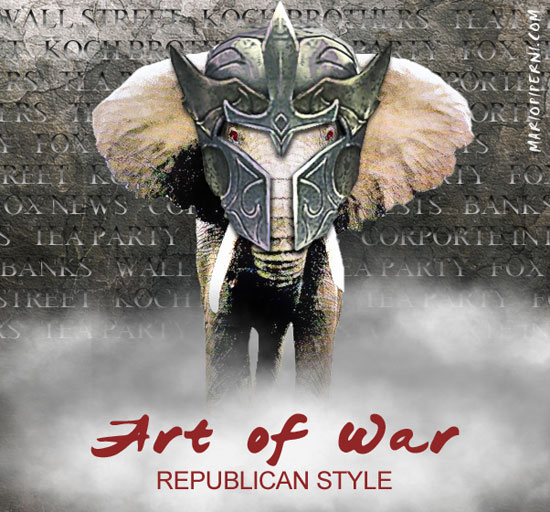The Washington Post is framing this as a potential Ronna McDaniel requirement, however given the RNC under Reince Preibus ended up having the same 2016 pre-debate loyalty demand, the requirement is more likely an institutional Big Club proposal and not the idea of the chair. The board and RNC charter members of the professionally Republican apparatus are the ones creating the litmus tests.
Essentially, you will remember in 2015 and 2016 the RNC demanded that all of the candidates swear an oath to whomever won the GOP nomination. In the first Fox News debate of August 2015, the candidates were told to raise their hand if they were not willing to swear or affirm their intent to support the eventual nominee. Everyone except Donald Trump (and Ben Carson) lied. WATCH:
The construct of the loyalty oath was predicated around the fact the RNC institution did not support an outsider like Donald Trump using their club system to achieve the office of the presidency. Trump was independent minded and held his own platform positions on trade, economics, border security and immigration that ran counter to the approved policy positions of professionally Republican members.
The RNC, as an institution of life-long tenured club members, viewed Donald Trump as not an acceptable RNC candidate, and therefore were worried he would mount an independent run if the RNC effort to remove him from their party was successful. The alternative fifteen candidates were all previously approved by the RNC establishment, except Donald Trump.
As a consequence, in the 2016 contest the RNC sought to portray Donald Trump as unapproved, yet they simultaneously needed to keep up the false pretense that U.S. politics was not subject to the whims and approvals of two monopolistic private corporations (RNC and DNC). In the decade that preceded the 2016 election, CTH was one of the few places not pretending about this dynamic.
 However, in the years following the 2016 revelations, there has been a much larger awakening. The 2012 result of Mitt Romney (7% primary support) combined with the 2016 Hillary outcome (22% primary support) and the 2020 Biden outcome (6% primary support) have solidified as examples of how these corporation’s function.
However, in the years following the 2016 revelations, there has been a much larger awakening. The 2012 result of Mitt Romney (7% primary support) combined with the 2016 Hillary outcome (22% primary support) and the 2020 Biden outcome (6% primary support) have solidified as examples of how these corporation’s function.
Thankfully, today more voters understand that U.S. political candidates are controlled by two private corporations and the billionaire financial donors/institutions who fund them.
Here we enter the 2024 contest, again with the same pretenses needing to be maintained; thus, we see a replay of the loyalty test being demanded by the RNC to qualify the candidates for debate stage entry.
Unfortunately for the RNC, the overwhelming majority of 2016 RNC approved candidates, those who made and affirmed the pledge, lied about it. The reality of their effort to tear down and diminish the eventual nominee Donald Trump, including during the general election and well into his administration, stands as empirical evidence of the bullshit construct of the loyalty oath. Insert the reminder of Senator Ted Cruz saying “vote your conscience” at the 2016 RNC convention and getting booed off stage.
The only honest person on that debate stage in August 2015, was the guy who raised his hand, Donald J Trump.
(WASHINGTON DC) -Republican National Committee Chairwoman Ronna McDaniel is so concerned that party disunity will sink GOP hopes in the 2024 presidential election that she plans to require all candidates on the official primary debate stages to first pledge their support to the party’s eventual nominee. But many of the likely contenders are pushing back.
Former president Donald Trump said this month that he won’t commit to supporting the winner if he loses the nomination. “It would have to depend on who the nominee was,” he told a conservative radio host. Former Maryland governor Larry Hogan, another potential candidate, recently tweeted that he “won’t commit to supporting” Trump.
Others have settled on more nuanced hedges. New Hampshire Gov. Chris Sununu, who just created a new organization to help him explore a possible campaign, says he will support the eventual nominee, but is certain Trump won’t be that person. Former Arkansas governor Asa Hutchinson, who has not decided on whether to sign a pledge, has gone so far as to speak with McDaniel about his opposition to it, arguing that Republicans should not be enforcing litmus tests.
“Historically, our party has not taken party loyalty oaths,” said Hutchinson, who returned to Iowa this week as he explores a possible campaign launch in early April. “For leaders such as myself who believe Donald Trump is not the right direction for the country — and I said specifically that Jan. 6 disqualified him — that would certainly make it a problem for me to give an across-the-board inclusion pledge.”
The pushback has underscored McDaniel’s concern but has not shifted her plans, according to multiple people involved in the process who spoke on the condition of anonymity to discuss the planning. The Republican National Committee’s Temporary Standing Committee on Presidential Debates plans to meet next Wednesday and Thursday to formally set the rules for officially sanctioned debates this year. They intend to require candidates to sign a pledge to support the eventual nominee modeled on a similar document circulated by the RNC in 2015. (read more)
Oaths, loyalty pledges, litmus tests… all of it… None of it makes a damned bit of difference. Because in the big picture, the professional Republican apparatus will never support Donald Trump… because the multinational RNC donors at risk from the America First economic agenda, will not allow it.


